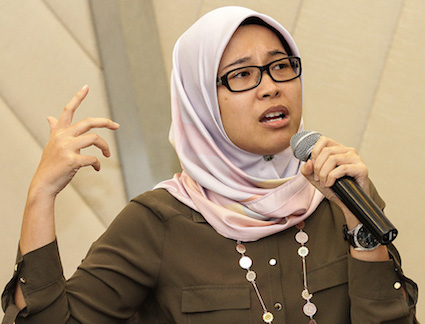Fadiah Nadwa: Act now to protect free speech

“This culture of fear among Malaysians is very strong. We can’t talk about religion, race, or royalty, but at the same time, we are a democracy. It’s a big contradiction we have to address.”
(FMT) – Activist lawyer Fadiah Nadwa Fikri, urging Pakatan Harapan to “seize the moment” to protect free speech, has expressed concern that despite the change of government on May 9, “it’s still the same old thing as before”.
She said the new government could have declared a moratorium on action under the Sedition Act – she is being investigated by police after an article last month on Anwar Ibrahim’s meeting with Malay Rulers.
She deplored the silence of PH leaders about the sedition investigation, but understood their position as government leaders.
“A government does what a government does. They don’t want to offend certain people. This issue is a controversial and taboo one since it touches on the monarchy. I totally understand their concerns.”
However, she also said she felt betrayed by Anwar’s actions in trying to set himself up for active politics.
She said the people needed to know they have a right to be critical and question the powers that be. “I’m concerned, too, that after May 9, it’s still the same old thing as before,” she told FMT in an interview.
“Being in a country that is heavily polarised, I think we have to do something now. When are we going to do it if not now?”
She urged Pakatan Harapan to do good on their promise to abolish the Sedition Act. “Pakatan Harapan stood for accountability and transparency. That’s what you said. You want to build a country that is democratic, so you have to put meaning to what you said.
“Don’t let it be just mere rhetoric,” Fadiah said. “You cannot interfere when people express their opinions on things that you consider taboo.”
Fadiah’s recent article was about Anwar Ibrahim’s meeting with several Malay rulers after he was released from prison.
She wrote that, given Prime Minister Dr Mahathir Mohamed’s strained relationship with the monarchy, “there are no prizes for guessing why the prime minister in waiting (Anwar’s own self-description) did what he did”.
She had described his meeting with the Sultan of Johor as being “catatrosphic” and said it represented “indefensible feudal culture”.
Police reports were filed, leading to her being called up for statements to be recorded. She is expected to meet with the Brickfields police again in the following weeks.
Fadiah told FMT that Malaysians were not naive about why Anwar met the Rulers. He was trying to reaffirm his position in the “new” Malaysia, now that he was ready to be active in politics once more.
“I’m not naive to think that politicians will ‘save’ us, but when Anwar was released, I thought to myself, ‘Just maybe, something good would happen now’,” she said.
“After all, Anwar talked about the price of freedom after he was incarcerated for three long years. But now I feel betrayed as a person, and as a Malaysian citizen,” said Fadiah.
Malaysians should no longer be punished for talking about issues deemed controversial by the state.
“This culture of fear among Malaysians is very strong. We can’t talk about religion, race, or royalty, but at the same time, we are a democracy. It’s a big contradiction we have to address.”
Fadiah, 35, who hails from Alor Setar, Kedah, is a legal officer with the Centre to Combat Corruption and Cronyism.
She said there was nothing new about what she had written, but she was just being open enough to call things as she saw them.
“We know that power tends to oppress, divide and marginalise. We have to address these issues at this point in time. We can’t wait.
“What does it mean to wait, for people who don’t have a home, people who are vulnerable and are not recognised?”
“Everyone has a duty to be critical of power. And if we don’t exercise this duty, we’re complicit in perpetuating oppression. I have a duty to speak up. Of course, in this new Malaysia, I feel we should seize the moment.”

